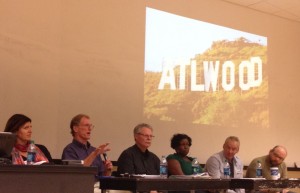Report from the Atlanta Media Industries Forum
 Two weeks ago, I attended a forum at Georgia State University in downtown Atlanta. The event’s activities focused on sharing ideas about the growth of Atlanta as a site of major media production and about the GSU Department of Communication’s development of a new working group dedicated to fostering partnerships with the area’s media industries for research and pedagogy. I came away with a rich awareness of the opportunities and challenges that both Atlanta and GSU have before them.
Two weeks ago, I attended a forum at Georgia State University in downtown Atlanta. The event’s activities focused on sharing ideas about the growth of Atlanta as a site of major media production and about the GSU Department of Communication’s development of a new working group dedicated to fostering partnerships with the area’s media industries for research and pedagogy. I came away with a rich awareness of the opportunities and challenges that both Atlanta and GSU have before them.
The showcase event of the forum was an afternoon panel session entitled “From Butler to Boo Boo: Atlanta’s Evolving Role as Media Capital.” There were three academic guests: Jennifer Holt, director of the UC-Santa Barbara’s Media Industries Project, which GSU’s working group is consulting for guidance; Thomas Schatz, who has similarly developed ties with regional media industries in his University of Texas at Austin home base; and Horace Newcomb, who has observed the recent changes in Georgia’s media ecosystem while at the University of Georgia in Athens. There were also three local industry guests: Alpha Tyler, a casting director formerly with Tyler Perry and now at BET; Paul Jenkins, a premier comics and video game creator and budding film producer; and Phil Oppenheim, senior vice president of programming and scheduling for TNT and TBS.
 Through the dynamic conversations that followed, I learned that Atlanta is indeed a burgeoning production center, but it has yet to approach media capital status. Georgia’s aggressive courting of film and television companies via tax incentives has certainly resulted in production volume, as over thirty television shows and countless feature films are shot in Atlanta and nearby regions. But the area lags far behind New York and Los Angeles in terms of development, financing, and post-production infrastructures. As I understand it, above-the-line talent swoops into Atlanta to shoot, uses local labor in below-the-line capacities, then gets on a Delta plane back to the coasts. Tyler noted that lead performers are usually brought in from LA, and even when local talent is used, producers want Atlantans who look like they could be Angelenos. Jenkins said that he aspires to produce a major feature film from development to completion in Atlanta, but the foundation for that just isn’t in place yet. And Oppenheim observed that Turner likely has more ties to LA and New York than to its headquartered home.
Through the dynamic conversations that followed, I learned that Atlanta is indeed a burgeoning production center, but it has yet to approach media capital status. Georgia’s aggressive courting of film and television companies via tax incentives has certainly resulted in production volume, as over thirty television shows and countless feature films are shot in Atlanta and nearby regions. But the area lags far behind New York and Los Angeles in terms of development, financing, and post-production infrastructures. As I understand it, above-the-line talent swoops into Atlanta to shoot, uses local labor in below-the-line capacities, then gets on a Delta plane back to the coasts. Tyler noted that lead performers are usually brought in from LA, and even when local talent is used, producers want Atlantans who look like they could be Angelenos. Jenkins said that he aspires to produce a major feature film from development to completion in Atlanta, but the foundation for that just isn’t in place yet. And Oppenheim observed that Turner likely has more ties to LA and New York than to its headquartered home.
Given the GSU working group’s concerns, a larger question then emerged: Would a GSU Communication professor recommend that graduating students stay in Atlanta to launch film and television careers, or is it still imperative for them to head to New York or LA? Given the information above, the answer was clearly the latter. But rather than a discouraging sign, some see this as an area for inspiration. Horace Newcomb proposed that Georgia State has the opportunity to start something that would be akin to UCLA creating a film research institute in the early 20th century or NYU launching a working group as its host city cranked up television production in the late 1940s. With such an opportunity to observe, or even intervene in, how a new media capital takes shape, Jennifer Holt suggested that GSU has one advantage over UCSB, which is the university’s direct proximity to its local media industry.
However, UCSB’s Media Industries Project has been quite successful at developing a research relationship with the production industry ninety miles south, particularly via their Connected Viewing Initative with Warner Bros., and it remains to be seen what GSU could foster. The working group has to offer a partnership that the local industries would find valuable. For instance, one initiative already underway is a mapping project that would provide an interactive database of information about area film and TV productions to unite dispersed production entities more efficiently. Further, the racial diversity of GSU’s student population deserves note. Rather than striving for “Third Coast” status, perhaps Atlanta could become the primary home for African-American dominated entertainment production, building into film and television what the music industry has already started.
Above all, Georgia State University wants to ensure it isn’t producing students as low-paid labor to feed the maw of Atlanta’s existing below-the-line ecosystem, while Atlanta-based creatives themselves want more opportunities for extended work at home. If both groups can work together toward their respective goals, perhaps ATL will soon be synonymous not just with its city’s name, but also with above-the-line production, as well as an academic template for localism.



Thanks so much for this, Chris. Just this past semester I had a conversation with a student wary of going to the coasts about the possibility of checking out Atlanta for production work post graduation. This definitely gives me more context for future advice.